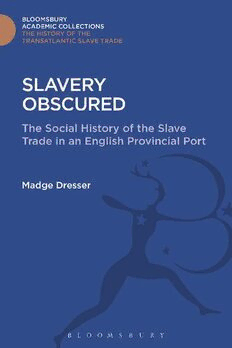
Slavery Obscured: The Social History of the Slave Trade in an English Provincial Port PDF
274 Pages·2001·114.648 MB·English
Most books are stored in the elastic cloud where traffic is expensive. For this reason, we have a limit on daily download.
Preview Slavery Obscured: The Social History of the Slave Trade in an English Provincial Port
Description:
Slavery Obscured aims to assess how the slave trade affected the social life and cultural outlook of the citizens of a major English city, and contends that its impact was more profound than has previously been acknowledged. Based on original research in archives in Britain and America, this title builds on scholarship in the economic history of the slave trade to ask questions about the way slave-derived wealth underpinned the city of Bristol’s urban development and its growing gentility. How much did Bristol’s Georgian renaissance owe to such wealth? Who were the major players and beneficiaries of the African and West Indian trades? How, in an ever-changing historical environment, were enslaved Africans represented in the city’s press, theatre and political discourse? What do previously unexplored religious, legal and private records tell us about the black presence in Bristol or about the attitudes of white seamen, colonists and merchants towards slavery and race? What role did white women and artisans play in Bristol’s anti-slavery movement?Combining a historical and anthropological approach, Slavery Obscured, seeks to shed new light on the contradictory and complex history of an English slaving port and to prompt new ways of looking at British national identity, race and history.
See more
The list of books you might like
Most books are stored in the elastic cloud where traffic is expensive. For this reason, we have a limit on daily download.
